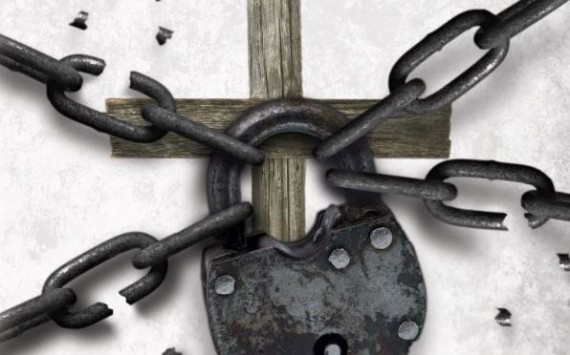In his book, The Multiplying Church, Bob Roberts writes this:
Let’s start a thousand churches over the next ten years, each one running a minimum of two thousand members, and in just ten years we will turn America upside down with the gospel! That would work, right?
Wrong – that scenario just happened over the past ten years, and there are fewer people in church today than ever before.
How can that be?
How could we have spent billions to start two thousand megachurches and yet have fewer people in church and a society that largely feels the church is antagonistic?
The answer (in my opinion) is that most of the people who start to go to those new churches are not new Christians, but people who were already Christians and who transferred to the new and exciting church. Most of the church plants grew by transfer growth, not church growth. Others have pointed out the supporting statistic that every year about 4,000 churches close their doors … forever.

Most “Religious” Groups are Dying
Then today, I was reading an article called “Change-Seekers” in World Magazine, which summarized the major study of the Pew Forum on Religion and Public Life (available here). The study revealed that currently only 51% of Americans are “Protestant,” down from 60-65% in the 1970s. The only “religious group” actually increasing in numbers are those who identify themselves as “non-religious.” They comprise 16% of America, and have nearly doubled in number since the 1980s. Then the author of the article says this:
Despite the church growth movement and the proliferation of megachurches, evangelical Christianity is losing ground. Growing churches often have high turnover. [Are they going to other new churches with a better show?] The issue is not how to gain new members but how to keep the ones churches already have.
Christians are Anemic
In The Multiplying Church Bob Roberts says that problem our churches face is that we are not seeing true life transformation in those who attend our churches.
I found this insightful, especially since on Friday, I read a book by Neil Cole called Cultivating a Life for God in which he reveals a way of discipling people which has resulted in amazing life transformation in the people that have done it worldwide. But the beauty of what he proposes is that this life transformation does not depend on the systems and structures that have come to be known as “church.” Instead, his proposal is simple, free, and easily reproducible. I just started reading his newest book, Search & Rescue, which appears to be an updated remix of Cultivating a Life for God.
It is my opinion that the way we do “church” today is more often than not a hindrance to the spread of the gospel and the making of disciples.
The Death of Churchianity
The death of churchianity is coming, and while it saddens me when churches close, I am also excited because I believe that a new movement of God is coming upon His people whereby we throw off the things that hinder what He is doing in our lives, communities, and countries, and embrace a new (actually old) way of being the church.
 This new/old way will not need millions of dollars to sustain itself the way churchianity does.
This new/old way will not need millions of dollars to sustain itself the way churchianity does.
It will live out the gospel among the people of this world by serving, living, and loving them, rather than just teaching facts.
Unlike churchianity, this new way of following Jesus will transform lives and communities. It will not require advanced degrees of education, high-powered leadership structures, costly buildings, expensive advertising, salesmanship routines, light shows and Hollywood gimmicks.
Those who leave churchianity won’t need experts to interpret Scripture for us, or to organize our discipleship programs and outreach events. Following Jesus outside churchianity won’t be limited to a single day, or a particular event.
When churchianity dies, we will stop going to church and simply be the church, the body of Christ. The death of churchianity precedes the resurrection of the church.
Therefore, since churchianity is dying, and we shouldn’t fight it. Churchianity is on life support and is begging us to pull the plug (which is why I wrote my book, Close Your Church for Good.
And as Churchianity fades away, I am beginning to see glimmers of light as the grime from centuries of tradition is scrubbed away, and the glory of God begins to manifest itself among groups of Christians who just want to live life like Jesus in their communities.
(Note: After writing this post, I learned that before he died, Michael Spencer wrote a book called Mere Churchianity. I haven’t read it, but it looks good.)




Churchianity…
I like that term; is it current or did you coin that?
I think Churchianity may be what secularists are actually fighting, not Christianity. Not belief itself, but one belief to the exclusion of all others and the cult of belief (as in lifestyle) to that of society at large.
I’ve always assumed that these mega-churches are either Baptist or Pentecostal, is that right?
I’m in one of those new movements, you describe happening in the future, that started in the 70’s. We did almostly EXACTLY what you describe. Up until the last few years it was labeled a cult. Then we decided we wanted to fit in. 🙂
We’re losing the cult label, but we’re also losing some of that closeness. We still got a lot of great things happening, but I see assimilation in our future.
It seems like churches do what you describe rather frequently. It’s not new, just part of the cycle. Keeping it real.
Bullet,
I don’t think I coined the term, but I don’t remember when/where I first heard it.
You are right about what secularists are fighting. They (rightfully in my opinion) see some of the abuses of the church, and condemn them. Sadly, many throw out the baby with the bathwater and reject the whole thing.
Regarding megachurches, they come in all flavors today. Most of them are probably Baptist or Pentecostal, but there are many which are non-denominational as well. And they are popping up all over the place since, to a large degree, creating a megachurch just takes marketing and money.
Missy,
It’s true that this is just part of the cyle.
If you don’t mind telling, what is the name of your church?
Jeremy, I’m not sure what we’re called now, but we were the movement known as ICOC – Int’l Church of Christ. It was a movement torn from the Church of Christ – campus movement bent on changing the world, crying for change. Our big thing over the years has been the practice of discipleship.
I’ve visited other ICOC churches across the country, and noticed those of us numbering less than 300 are most successful in living as a church like you’ve described. We get bigger, it falls apart. Smaller than 150, it gets overly controlling – this is where the “cult” rep comes from.
Peace be with you Jeremy, as well as those able to read this message.(if not censored)
The time has come, the harvest is ripe.
Make sure to share this with fellow believers.
The Faithful Witness
Jeremy…I enjoyed this article and have recognized for years that most megachurches and many church plants are growing simply by transfer growth. But, I have a little different take on this “new/old” way of being the church you speak of. This “new movement” has been moving since the first century. God has always had His remnant and even though His people have a strong tendency to stray from Biblical Christianity, His Spirit is constantly working. Even within “churchianity” He is able to transform lives and there are millions who could testify to that fact. I believe what we are seeing in our time is the purification of the church. Similar to China, where there are no cultural Christians, the West is quickly losing all cultural expectations related to church-going—which I see as the same thing as “churchianity”. But make no mistake, Jesus has been building His church since Pentecost. It has been obscured by “churchianity” in our time, but it is by no means a new movement.
Shaun,
I think I might agree with you now. This post was originally written about five years ago, and I have come a long way in my thinking since then….
🙂 Didn’t see the “five years ago” stamped on the comments. I guess once you blog, the conversation can continue indefinitely!
Ha. Yep!
Leave churchianity and the religion of christianity. Realize humans make up the Church, not brick and mortar. Live your Christianity daily by showing the love of God to all people.
OK..there is a difference between the followers of Jesus and those of the religious system of today. Church growth being what it is, in attendance figures, dollars etc. The characteristics of Christians today match that of the Pharicees and the high priests. Just how does anybody expect the true body of Christ to emerge from this institution.? How do the masses begin to learn and practice the truth.? from an institutionalized system that doesn’t contain the truth.?
The ekklisiasta or the followers of Christ were and still CALLED OUT OF the system. They don’t join anything. There were plenty of religions and movements long before Jesus’ time and they didn’t die off. Jesus did not start a new religion or start taking up membership rolls. The apostles dropped out of the system to follow Jesus. The left even their homes, community roles, jobs, and families. They were homeless and dressed in rags. Some people saw the wonders of Jesus and wished to join but they wouldn’t drop out of society to be a follower. The point is, how do followers of Jesus come from church members.? Is a large bucket of the way the truth and the life going to be dumped out on their heads.? Is one supposed to wait until the masses in the religious system get real.? Jesus didn’t accomplish such a feat. If he did so he would never been crucified. When a person decides to leave today’s church, the church people either try to win them back by a parable of their own describing a three legged stool or a red hot coal rolling off to side of a huge pile of hot coals thus the single coal cooling fast.? They’re trying to win folks back into the circle of churchians and detract them from even learning how to follow Jesus. At Sodom and Gomorrah there was just one person worthy to be saved from destruction.
Scripture tells me the road is narrow, hard to see at times, and it is a lonely road. Just how does a large body of today’s church crowd accomplish righteousness.? Why are those done with the church system count as quitters when they may have been called out of the system.?
Absolutely true! Thanks for the comments and the insight. It is sad that people who follow Jesus away from institutional Christianity are condemned by those within it for “abandoning Jesus and the church” when they are really seeking to follow Jesus and BE the church.